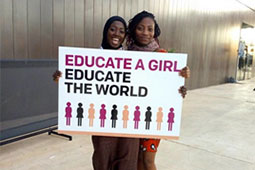
Education Really is For All: The Important but Invisible Successes of Civil Society Activism
Date: May 2024
Author(s): Naomi Hossain, Felipe Hevia, and Abrehet Gebremedhin
Publication type: Blog
Published by: Global Partnership for Education
This blog first published by the Global Partnership for Education, May 22 2024. Also available in French.
These are dangerous times to be an education activist: you could face months in jail for daring to educate girls in Afghanistan, or prison time if you’re a librarian stocking “banned books” in the USA.
It was not always as risky to advocate for education. For a quarter century, non-governmental organizations (NGOs), campaigners, volunteer groups and social movements helped shape global education policies through the Dakar Framework for Action on Education for All.
Civil society groups advocated for inclusive education for children with disabilities, found ways of educating displaced and refugee children, and monitored education budgets.
But how much do we know about the difference civil society made in shaping education?
Our team at the Accountability Research Center, as one of the Global Learning Partners for GPE’s Education Out Loud, reviewed relevant literature from the last couple of decades to find out and produced an Accountability Brief with key takeaways for donors, governments and CSOs alike.
Civil society showed that education is really for all
When a global norm is established, it can be difficult to see the work involved to get there.
However, as we have found in our detailed literature review on the role of civil society in education policymaking in the Global South, the past 25 years have seen a remarkable but little-noted success: the achievement of global consensus that all children, everywhere, have the right to go to school (implying public provision where possible), and to learn. This involved extensive campaigning, advocacy, and pilot initiatives to reach those excluded from school.
Leadership by the Global Campaign for Education, an international coalition of NGOs, social movements, teacher unions, national education coalitions, and other civic groups, helped coordinate activism and amplify its effects.
The fact that extremist groups such as the Taliban and Boko Haram are excluded from the international community because they oppose basic education for all tells us a great deal about how universal the idea has now become. It is easy to forget quite how much activism went into establishing this norm – or that it was by no means inevitable.
… but civil society was more successful in promoting access than improving quality
Broadening access to basic education was broadly popular with parents, students, governments, teachers, aid donors, and the general public. But advocating for improved quality to tackle the learning crisis has been harder: evidence about what works is less clear, strategies are more complex, and civil society actors are more divided in their ideas and their interests.
Some civic groups, like Pratham in India, have shown how action-oriented research and mobilization can ensure “all children are in school, and learning well” (their tagline). But it has generally been harder for civil society to campaign on learning reforms than on access and there has been less cohesion and effort overall in civil society’s push for a shared advocacy agenda.
Civil society is being choked
Political context matters: civil society had its heyday in the optimistic era of the Millennium Development Goals and the Education For All movement. This was after the end of the Cold War: democracy was on the rise, civic space was broadening, and donors and many developing country governments were willing to include progressive, rights-oriented NGOs and civil society groups in education policymaking. That era is now over.
Civil society leaders also tell us that funding has been squeezed, as donors demand more “rigorous” evidence of impact than civil society advocacy – often constrained by both financial and political pressures – can produce. Perhaps most worryingly, civic space is changing everywhere, with conservative groups taking up more of the policy space than before.

Hard lessons
While civil society played a crucial role in establishing the all-important norm that education really is for all, the political context has changed.
Our review of the literature raises some difficult questions. Were the partnerships between governments and civil society a mere historical blip, part of the post-Cold War peace dividend? Can they continue to cooperate in contexts of rising authoritarianism, political polarization, and dwindling budgets? Can civil society bring about consensus on how to address the learning crisis as they (mostly) did with access? Are donors and governments taking the role of civil society in education for granted?
Without the space and funding to continue, NGOs and movements are likely to struggle to hold governments accountable for delivering on their promises to ensure that education really is for all.
Naomi Hossain is a political sociologist and Professor at SOAS University of London. Her research focuses on the politics of inclusive development, or how people get the public services they need. In international collaborations, she has researched food and fuel riots, the politics of public service delivery, closing civic space, and the politics of Bangladesh’s development success. Some of her work can be seen here.
Felipe J. Hevia received his doctorate in Anthropology from Centro de Investigaciones y Estudios Superiores en Antropologia Social (CIESAS), where he has been a Research Professor since 2009. His research interests focus on citizen participation, accountability, poverty reduction and education. He is coordinator of the project Independent Measurement of Learning (MIA), and a member of the Mexican Academy of Sciences and the National System of Researchers of Mexico. fhevia@ciesas.edu.mx @fhevia
Abrehet Gebremedhin is a researcher at the Accountability Research Center and a PhD candidate at the School of International Service at American University in Washington, D.C. Her academic research centers on monitoring and evaluation, civil society engagement in education and health, transnational aid for education, and youth mobilization.
